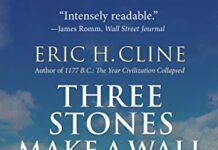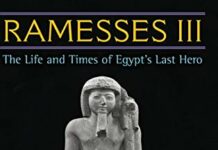
Ebook Info
- Published: 2021
- Number of pages: 290 pages
- Format: PDF
- File Size: 2.94 MB
- Authors: Eric H. Cline
Description
A bold reassessment of what caused the Late Bronze Age collapseIn 1177 B.C., marauding groups known only as the “Sea Peoples” invaded Egypt. The pharaoh’s army and navy managed to defeat them, but the victory so weakened Egypt that it soon slid into decline, as did most of the surrounding civilizations. After centuries of brilliance, the civilized world of the Bronze Age came to an abrupt and cataclysmic end. Kingdoms fell like dominoes over the course of just a few decades. No more Minoans or Mycenaeans. No more Trojans, Hittites, or Babylonians. The thriving economy and cultures of the late second millennium B.C., which had stretched from Greece to Egypt and Mesopotamia, suddenly ceased to exist, along with writing systems, technology, and monumental architecture. But the Sea Peoples alone could not have caused such widespread breakdown. How did it happen?In this major new account of the causes of this “First Dark Ages,” Eric Cline tells the gripping story of how the end was brought about by multiple interconnected failures, ranging from invasion and revolt to earthquakes, drought, and the cutting of international trade routes. Bringing to life the vibrant multicultural world of these great civilizations, he draws a sweeping panorama of the empires and globalized peoples of the Late Bronze Age and shows that it was their very interdependence that hastened their dramatic collapse and ushered in a dark age that lasted centuries.A compelling combination of narrative and the latest scholarship, 1177 B.C. sheds new light on the complex ties that gave rise to, and ultimately destroyed, the flourishing civilizations of the Late Bronze Age—and that set the stage for the emergence of classical Greece.
User’s Reviews
Reviews from Amazon users which were colected at the time this book was published on the website:
⭐I found the theories about the development of civilization of “early man” from hunter-gatherer bands and early agriculturists to be fascinating. The theories about cities rising without the need for a ruling class was very well developed and worth further investigation. I enjoyed reading about the interconnectedness of all the different kingdoms and empires of the early Bronze Age. The newly translated documentation about trade, diplomacy and state affairs was well researched and held my interest. The last part of the book tended to repeat the basic theory of destruction of the early Bronze Age civilizations long after the message had been made several times. There has been no evidence in the historical or archaeological record to understand why the great empires and kingdoms of the early Bronze Age collapsed within the same time period. Until science can amass more data and find answers, the mystery creates speculation. On the whole, the book was a great read for me and made me realize that my own views of the greatness and intelligence of hunger-gatherer societies is vindicated. This is a book for those who love ancient societies and have a basic understanding of pre-history as well as the earliest histories of the eastern Mediterranean.
⭐1177 B.C.: The Year Civilization Collapsed: Revised and Updated by Eric H. Cline documents what is probably the first collapse of what we now call a world order, the Bronze Age. In the past, scholars looked for one reason for this collapse and usually hung the blame on the so-called Sea Peoples and their seemingly omnipresent invasions.Now history and historians are pivoting and realizing that it is usually a bundle of factors that produce societal collapse, as events like climate change, warfare, migrations, earthquakes, pandemics, and volcanic eruptions, interact to create multiplier and domino effects.This sounds a great deal like our world, does it not? This appears to be Cline’s thesis. Is our world too “complex” to survive? Have our multipliers gotten out of hand? Are dominos starting to fall? We really won’t know until we can’t read anymore, and new Homers are singing of a lost golden age.
⭐Eric Kline’s 2nd Edition of the book 1177 BC: The Year Civilization Collapsed is an epiphany for those who stood before the mute stones of Mycenae, Troy, Egyptian Pyramids, and Armageddon trying to decipher events a thousand years hence. Professor Kline’s book presents hard facts, dates, and direct Bronze age reports of mythological events recorded centuries later in the Iliad, Odyssey, and Hebrew Bible. We know the stories but what is the reality reflected in the folk memory of such cataclysmically important events.Decades of science and scholarship slowly reveal a sometimes-frightening story of vibrant lives snuffed out by uncontrollably violent, tragic events. The most direct reports come from cuneiform letters on clay tablets between kings, merchants, and high official recording treaties, marriages, gift exchanges, requests for foreign aid, and so many other events of the day sounding as if they were yesterday’s CNN news reports. These tablets from sites in present day Egypt, Israel, Syria, Cyprus, Crete, and Iraq summarize the results of over 100 years of archeological excavations, documentation, and scholastic study of clay document records. A historical literature describing a highly sophisticated cooperative societies existing over thousands of years.The intensity of trade and interchange of Bronze age civilization is most poignantly portrayed in careful reports of underwater excavations of trading ships off the coast of Greece, Egypt, and Turkey. George Bass from Texas A&M created a new field of study by documenting the 1300 BC shipwreck at Uluburun, Turkey with goods from sources in Egypt, Mesopotamia, Afghanistan, Cyprus, Mycenae, Minos, and many other ports of call around the Mediterranean and Aegean seas. Most important were the discovery of tin ingots from Afghanistan and copper ingots from Cyprus, used for smelting of Bronze. Enough to create swords and armor for 300 soldiers of the king’s army. This lively trade, interchange and prosperity over centuries came to a crashing close for multiple collaborating empires – Hittite Empire, Kingdom of Minoa, Kingdom of Mycenae, and Babylonia. Only the weakened Egyptian Empire survived following their triumph over the invading sea people in 1177 B.C. It was the end.What caused the rapid decline and collapse of such a vibrant civilization. For almost a century scholars attributed downfall to invasion by the “sea people” mentioned in multiple Egyptian documents. This convenient explanation could not be corroborated with archeological evidence to show who they were, where they came from and why they so suddenly appeared with forces sufficient to topple established empires with powerful armies. Using instrumentation developed in physics laboratories, experts dated events of destruction using Carbon-14. Electron microscopy of pollen deposition in cores from lakes, rivers, and seas show a clear century-long picture of mega-climate change relating to written historical events. The global summary is a chilling picture of one possible future for present-day civilizations. A mega-drought lasting centuries caused famine, political unrest, revolution by the lower classes and organized emigrations of forces – raiding armies – to find better living conditions. Trade collapsed due to roaming bands of bandits and pirates.The final chapter of Kline’s book ponders the constant rise and fall of empires, kingdoms and entire collaborative groups forming a coherent civilization. He concludes “we should not think our current world is invincible, for we are in fact more susceptible than we might wish to believe.”1172 B.C. is a worthwhile read especially when considering the ever-crazier people behavior in response to stresses. Many wish to ignore the risks of increasing carbon dioxide gas content in the atmosphere caused by human activities. Science competes with magic for the attention of the masses. Science appears to be losing.
⭐I saw a video by this author about this subject and was so intrigued, I bought his book. I am not a big fan of ancient history (slept through that class in HS, lol), but this book is written for casual readers too. The author refers back and ahead so that readers can better keep up with the place and person names. If you are really into it, there are over 100 references to look up. He makes it clear that there is much we do not know about how or why the Bronze Age ended or so many kingdoms were abruptly destroyed. He does a good job of explaining the various hypothesis that have been promulgated over the decades and how some have been partially or totally debunked with new discoveries. My only criticism is the poor quality of the map of the areas in question that is printed in the book. I would have paid more to have a fold-out, color map for reference. I know kingdom boundaries shifted often, but a quality, general map with all of the cities would have been a nice touch. I did find one online from about that time period and printed it, but it does not show all of the locations mentioned in the book. I recommend this book for anyone with interest in the late Bronze Age and the parallels between then and now (globalization, climate change, disease, internal strife).
⭐When the title to a book is “1177, the year Civilisation collapsed” you expect to learn about the collapse, the before and after difference, and the relevance of the date. When everything is about ‘before’, the date is hardly mentioned, and no before and after comparisons are offered then it doesn’t matter how much scholarship went into the book, it did not deliver on its promise. That said, a huge amount of detail about Late Bronze Age in the area that i wouldn’t otherwise have had the chace to read.
⭐Der Autor gibt an, den Untergang vieler Bronzezeit-Zivilisationen um 1200 untersuchen zu wollen, was er in der ersten Hälfte auch stichwortartigund recht kärgllich tut, um dann aber in das haltlose Theoretisieren vieler, insbesondere angelsächsischer Kollegen zu verfallen, die sich nicht damit abfinden wollen, dass man sehr wenig Handfestes weiß. Anstatt das zu vertiefen, was man von einigen Tontäfelchen und Papyri und der mageren Ausbeute der Archäologie wissen kann, bleibt es bei wenigen kargen Fakten und viel Geschwätzigkeit.Besonders unangenehm wird es, wenn der Autor seine privaten Kenntnisse von Aspekten moderner Amüsierindustrie zwischen James Bond und Harry Potter beimischt oder anfängt in modischem Parlando zu politisieren. Manche Begrifflichkeit bleibt bei derartigem Plauderton reichlich viel unklarer als nötig wäre.Ich warte weiter auf eine grundlegende Darstellung des Forschungsstandes über die despotischen Palastzivilisationen der späten Bronzezeit zwischen Ägäis und Mesopotamien.Além de uma boa escrita e informações relevantes, o livro de Eric Cline traz uma visão incrível da Antiguidade, mostrando sua tese de uma primeira era de globalização no mundo antigo, com um intenso e extenso comércio internacional, relações diplomáticas, casamentos inter-reinos para construção de alianças e, claro, guerras. Usando como fontes seu próprio trabalho de campo e dos mais avançados estudos arqueológicos da região do Mediterrâneo, temos uma história fascinante descortinada da ruína das cidades antigas e das correspondências descobertas nesses sítios arqueológicos. Simplesmente incrível! Minha edição foi a atualizada de 2021, que é ainda mais sensacional. A compra foi excelente, chegando exatamente no prazo previsto.Want more . I want more. We need extensive weather history for the whole Med. We need more DNA analysis of the different players. Metalurgical analysis of the Sea peoples various weapons. Since Egyptian royalties are used for datation a lot. We need more precise kings list datation.This whole collapse is a giant wave or waves from west to east of the Med. We need more info on the detonator of that destruction.Apart from that . This book is a SOLID GOOD YARN 🙂
⭐The book is well researched and has a ton of facts. if you are history junkie this will work for you. It is however not really written with a consistent story in mind. So it reads more like a history text book and less like a novel or a book for relaxation. Fascinating subject, felt the author left the pre-face and afterword hanging a bit. They were framing the new version of the book in relation to the current socio/political events with Corona, Nationalism and Climate changing impacting our world… but then never really came back to that framing in the book and thus it felt like they wanted to make a statement, but then did not really dare drive an opinion home with this book. A shame… Either don’t bring it up at all, or finish the thought line.
Keywords
Free Download 1177 B.C.: The Year Civilization Collapsed: Revised and Updated (Turning Points in Ancient History Book 1) in PDF format
1177 B.C.: The Year Civilization Collapsed: Revised and Updated (Turning Points in Ancient History Book 1) PDF Free Download
Download 1177 B.C.: The Year Civilization Collapsed: Revised and Updated (Turning Points in Ancient History Book 1) 2021 PDF Free
1177 B.C.: The Year Civilization Collapsed: Revised and Updated (Turning Points in Ancient History Book 1) 2021 PDF Free Download
Download 1177 B.C.: The Year Civilization Collapsed: Revised and Updated (Turning Points in Ancient History Book 1) PDF
Free Download Ebook 1177 B.C.: The Year Civilization Collapsed: Revised and Updated (Turning Points in Ancient History Book 1)




